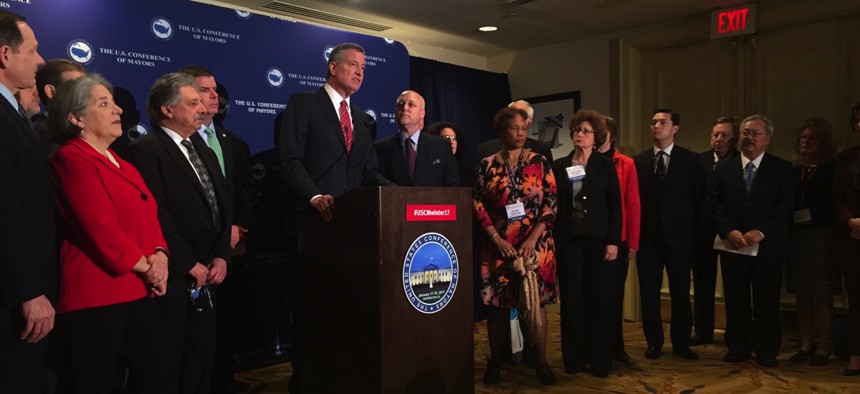Mayors Stand Together in Support of the Affordable Care Act

New York City Mayor Bill de Blasio speaking at a press conference as part of the Winter Meeting for the U.S. Conference of Mayors. Quinn Libson / Route Fifty

Connecting state and local government leaders
“We are all here to say you cannot replace something with nothing, and you cannot replace something with something worse.”
WASHINGTON — As Republican members of Congress continue to take steps toward repealing the Affordable Care Act, mayors of cities across the nation want to make it known they won’t let the health care law go down without a fight—and they certainly aren’t willing to let the law be slashed without an established path to replacement.
Twenty-five mayors stood together shoulder to shoulder at a press conference on Wednesday that was part of the U.S. Conference of Mayors annual winter meeting, to demonstrate their dedication to maintaining health care coverage for the people they represent.
“We are all here to say you cannot replace something with nothing, and you cannot replace something with something worse,” New Orleans Mayor Mitch Landrieu, who currently serves as USCM vice president, said on behalf of the group of mayors at the press conference.
Landrieu was joined at the podium by New York City Mayor Bill de Blasio and Boston Mayor Marty Walsh—who, together led a panel discussion on the subject earlier in the day—along with mayors representing St. Louis, Missouri; Knoxville, Tennessee; Hartford, Connecticut; Mesa, Arizona; Carmel, Indiana; San Francisco, California; Gary, Indiana; and Minneapolis, Minnesota among others.
The mayors of New York City and Boston, both Democrats, have perhaps taken the most public stances to date resisting the dismantling of the law.
In late December, de Blasio announced an $8 million initiative called GetCoveredNYC to enroll 50,000 more New Yorkers in health insurance through the Affordable Care Act by the end of 2017.
“Right now, the Affordable Care Act is alive and well,” de Blasio said during Wednesday afternoon’s panel discussion. And “until something changes, it’s still the law of the land, and it’s a law that has worked for tens of millions of people.” While that is still true, he says, “every additional person who signs up makes it harder to get rid of.”
In total, 1.6 million people in New York City already rely on health insurance through the ACA.
Likewise, Mayor Walsh has demonstrated his full support of keeping the Affordable Care Act in place. On Sunday, Walsh joined U.S. Sen. Elizabeth Warren and nearly the entire congressional delegation from Massachusetts on the steps of Faneuil Hall in Boston to stand in support of the ACA. Nearly 6,000 people attended the event.
Walsh made his views of the actions of Republican members of Congress clear on Wednesday: “We know who the repeal of this law would affect the most—people of color, senior citizens, people struggling with addiction … And as mayors we cannot stand by and let Congress put politics over people.”
On the whole, polling data would suggest that the majority of Americans agree that it would be irresponsible to dismantle the current system without first determining what would take its place.
According to the latest Kaiser Family Foundation poll, released Jan. 6, 47 percent of the public does not think Congress should vote to repeal the ACA while 28 percent of the public thinks that Congress should wait to repeal the law until the details of a replacement have been announced.
While Mayors de Blasio and Walsh and others are preparing to dig their heels in for a fight, some of the city executives present on Wednesday seemed more willing to accept the healthcare law’s demise as inevitable. But, even those mayors emphasized that if Republican lawmakers determine the ACA must go, it needs to be immediately replaced by a piece of legislation that has been vetted as thoroughly as the Affordable Care Act was when it was put in place.
John Giles, mayor of Mesa, Arizona, was one of the two Republican mayors present in the group at Wednesday’s press conference. In his statements—although he spoke of his constituents having been “blessed tremendously by the ACA”—he seemed resigned to the fact that the ACA will ultimately be repealed. He hopes, however that the process to create its replacement will be far more bipartisan than the process that birthed the ACA.
“Shame on the Republican legislators who were obstructionists during the Obama administration,” he said, following up that rebuke with a call for the Democrats now to eschew that type of behavior moving forward with future healthcare reform initiatives.
Quinn Libson is a Staff Correspondent for Government Executive’s Route Fifty based in Washington, D.C.

NEXT STORY: U.S. Mayors to Congress: Pass Comprehensive Immigration Reform





